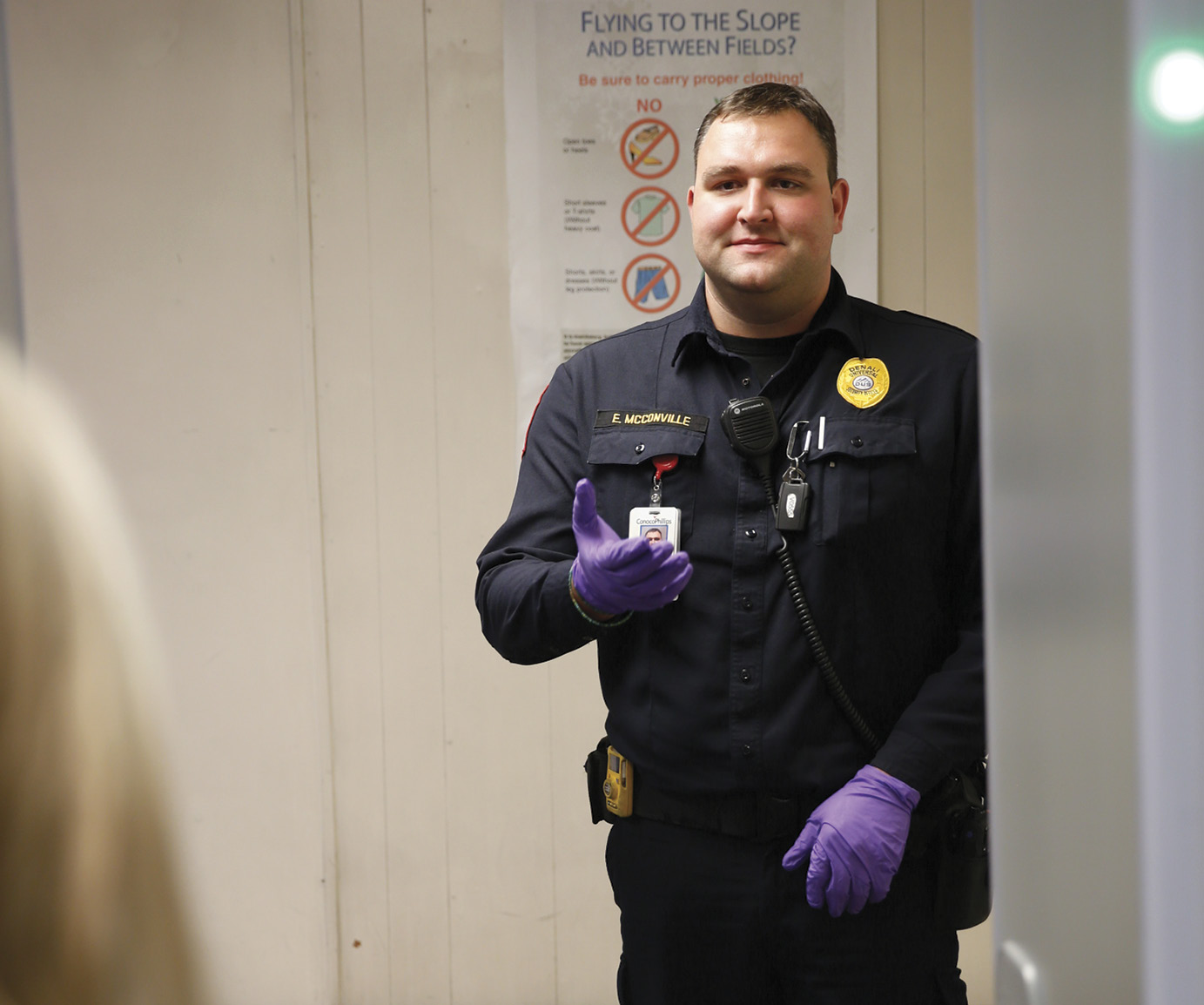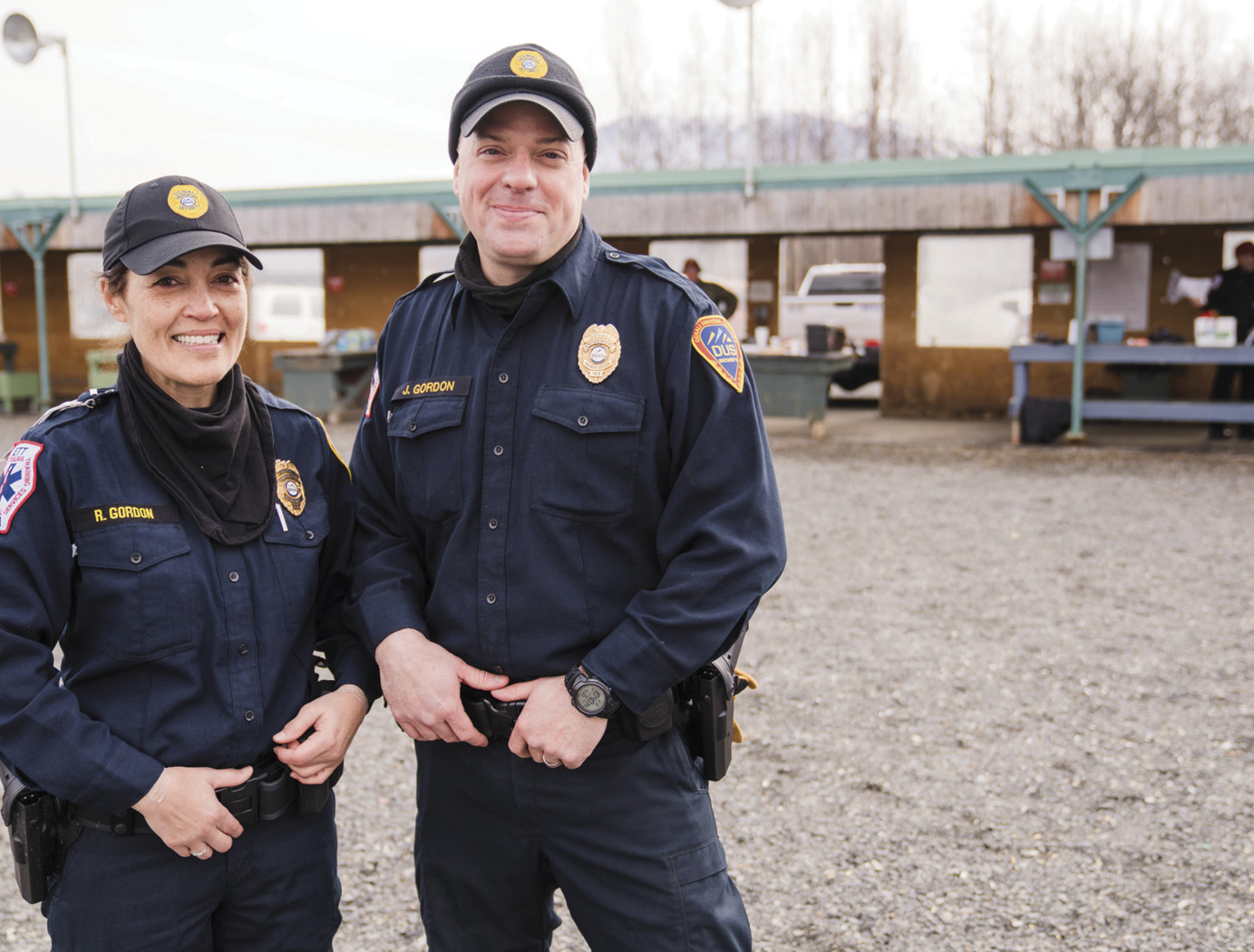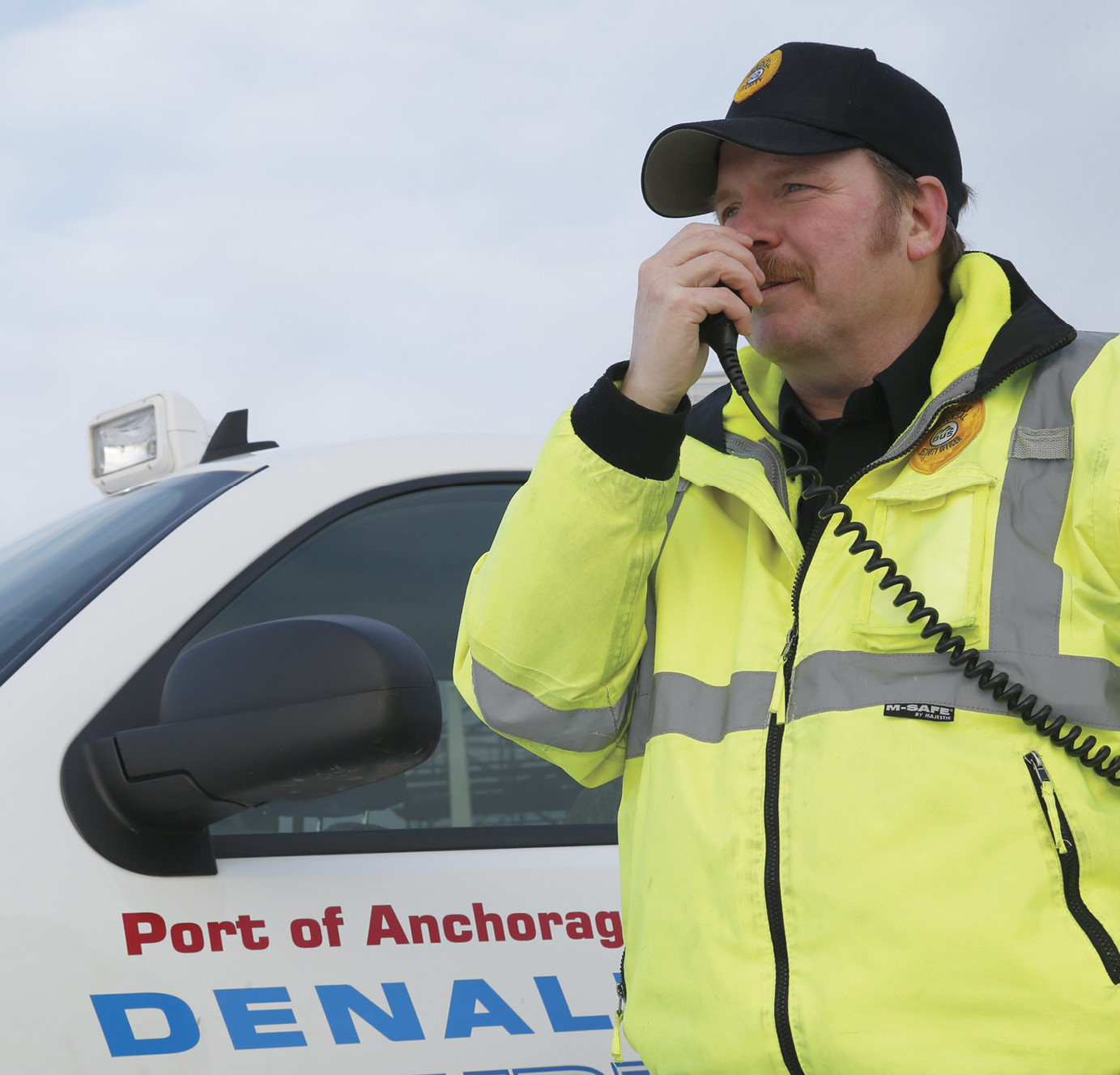uarding the lobby of an office building. Watching the entrance gates at a conference venue. Patrolling a fairground, head on a swivel. Responding in the dark of night to a burglar alarm. Monitoring camera feeds from a remote panopticon. Private security takes many forms, and providers have many tools to protect clients’ assets.
According to Gitnux Market Data, more than 1 million security guards were employed nationwide in 2020, and revenues from contract security services totaled around $41 billion. Demand for these services is projected to reach nearly $46.2 billion in North America by 2024.
In Alaska, demand is growing as well.
“What’s happening in the country in general—with active shootings, defunding police activism, and more—has increased interest in the demand for private security as a result,” says Denali Universal Services (DUS) President and CEO Maria Bourne. “We’ve definitely seen an increase in activity due to larger social changes.”
Established in the ‘80s, DUS has grown from a small business in Anchorage to a full-service security company that also operates in Washington, Texas, Louisiana, Oklahoma, Indiana, and elsewhere. In Alaska, the company works in facility management on the North Slope, in addition to providing security services.
“We provide security for a lot of different industries ranging from upstream and downstream oil and gas to hospitals, schools, corporate services, sports and leisure, tourism, local and federal government entities, and more,” Bourne says.
Depending on a client’s needs, DUS provides armed or unarmed security officers as well as technological solutions. “We make sure that they work together and augment one another,” says Bourne. Onsite security may be combined with closed-circuit cameras and artificial intelligence options that utilize facial recognition technology and help provide threat analysis. The company also provides emergency response and industrial fire services.

Denali Universal Services
SSNW also provides canine services. “This is a great force multiplier,” says President and CEO Joe D’Amico. “Instead of hiring four or five officers, a company can hire an officer and a dog.” He notes that there is a three-month lead time on this service, as training is required at a higher level.
In Alaska, SSNW provides services to the legislative building in Anchorage, Nordstrom Rack, and numerous retail locations. “We also do a lot of temporary work; for example, when a building collapsed last winter with loss of life, we provided security to maintain the integrity of the site,” says D’Amico. “We recently did a funeral for a family up near Wasilla, and we provided security at the Tanana Valley State Fair in Fairbanks and the World Eskimo-Indian Olympics.”

Denali Universal Services
It was an especially trying time because at the beginning of the pandemic, no one knew quite what to expect, according to D’Amico. “It took some brave officers to work in quarantine areas in Seattle and Alaska, which we did over multiple years,” he says.
While the pandemic may be waning, unfortunately danger remains. Part of SSNW’s temporary work includes preventing workplace violence.
“A company might have had a bad termination, and the person made a threat. Or a person gets upset when their unemployment benefits are denied, or there’s a family issue at a child welfare agency,” says D’Amico. “Unfortunately, over the forty-plus years I’ve been doing this, I’ve noticed that things have gotten much more hostile within the workplace and government agencies.”
“Once we provide an officer, it goes against us and our general liability policy if something happens,” says D’Amico. “Especially if you are employing armed security, you need to make sure that they have the training and expertise to be there so that you are covered in a lawsuit.”
He adds that high turnover makes recruitment a burden. “Some companies spend six months training a person, and then they leave, and they have to hire someone new and start all over. It’s a lot easier to just pick up the phone and say that you need an officer on-site in the next two hours,” D’Amico says.
Questions a business should ask before employing a security vendor include their length of time in business, places worked, and liability coverage.
“While the state may only require $300,000 to $500,000 in liability coverage (depending on if you’re hiring armed or unarmed officers), you would want $1 million to $5 million in coverage,” says D’Amico. “If a company doesn’t have at least $1 million in liability, you shouldn’t employ them. This separates the men from the boys.”
He adds that prospective clients should ask for at least three references, a copy of the company’s Alaska security control license, and a cover sheet showing policy limits.
“You should also see if you can talk to someone immediately because that’s an indication of the level of service you may get from the provider,” he says. “We have a 24-hour command center owned and operated by us so that when calls come in for service, they are transferred immediately to my cell or the vice-president’s cell. A lot of times, security needs are time sensitive.”
Denali Universal Services

“Even if you think you can’t afford to hire a full-time firm, you can hire someone to come out eight hours a week randomly just to have a presence,” he says. “In many cases, you don’t have to have security eight hours a night, seven days a week.”
Denali Universal Services

She notes that a company’s leadership is important, as is the chain of command.
“There’s a stigma in the industry that security is just a body at the gate, and some companies don’t understand the value of having the right person in place,” says Bourne. “If you’re only looking for a low-cost provider that pays a low wage and makes no investment in training, leadership, and skills, then you’ll get what you pay for.”
That’s only the private sector; police forces are a different animal, yet police draw from a similar talent pool with the added perk of training academies. Private security can tap into that career track, however.
“When we hire, we try to find people who have either military experience or law enforcement experience, such as reserve police officers, Coast Guard officers or Army veterans, or someone who has had at least five years of previous security experience, and we build on that,” says D’Amico.
Each state has their own mandated security training requirements that include background checks and a specified amount of training, though some security companies go above and beyond. SSNW started its own academy as a pilot program two years ago, which provides training in use of force, “verbal judo,” and more.
“We believe that this program is helping us to produce higher quality officers, and we’re planning to use this same model in other states,” says D’Amico.

Security Services Northwest, Inc.
“We made a decision when envisioning the future of DUS that we would serve critical infrastructure—industrial complexes, aerospace, ports, et cetera—and that requires that we hire people with good judgement and greater experience,” says Bourne. “People must come to the table with certain skills.”
DUS’ rigorous recruitment process includes background checks, behavioral assessments, and in-person interviews, and every employee goes through a six-month orientation period to determine if they are the right fit for the team and can do the job safely and effectively. The company also invests in ongoing training that includes tactical firearms, de-escalation scenarios, techniques of arrest, and more. The entire workforce also goes through an annual refresher course.
In addition, DUS provides leadership training, not just for managers but for those up-and-coming in the field. “We want to provide our people with the opportunity to get leadership training and customer service training, so that they can interact with clients and the public, as well as whatever job-specific training is required by the industries in which they work,” says Bourne.
She notes that the company’s handpicked leaders are not all in the company’s headquarters but also serve as front-line supervisors in the field, working with both teams and clients. “When we’re hired to provide security at a business, we also assign a relationships manager as the account manager who works with the client through the entire life of the contract. They are dedicated specifically to oversee that relationship and make sure that services are delivered properly,” Bourne says.
Private security personnel are more than watchful eyes; they manage human behavior. As Bourne puts it, “We place our people strategically with the right accounts; we make sure that their skill sets match what the client needs.”